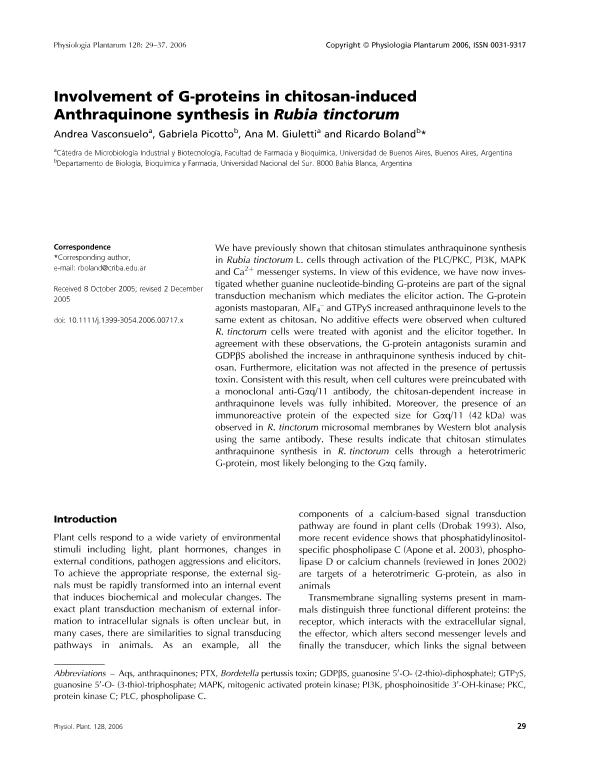Mostrar el registro sencillo del ítem
dc.contributor.author
Vasconsuelo, Andrea Anahi

dc.contributor.author
Picotto, Gabriela

dc.contributor.author
Giuletti, Ana M.
dc.contributor.author
Boland, Ricardo Leopoldo

dc.date.available
2019-08-29T18:13:36Z
dc.date.issued
2006-12
dc.identifier.citation
Vasconsuelo, Andrea Anahi; Picotto, Gabriela; Giuletti, Ana M.; Boland, Ricardo Leopoldo; Involvement of G‐proteins in chitosan‐induced Anthraquinone synthesis in Rubia tinctorum; Wiley Blackwell Publishing, Inc; Physiologia Plantarum; 128; 12-2006; 29-37
dc.identifier.issn
0031-9317
dc.identifier.uri
http://hdl.handle.net/11336/82507
dc.description.abstract
Elicitation with chitosan (200 mg/l) significantly stimulates (100%) anthraquinone (Aq) synthesis in Rubia tinctorum L. cultures, but the mechanism of elicitation is largely unknown.We recently showed that the effects of the elicitor involve phospholipase C (PLC), protein kinase C (PKC), phosphoinositide 3-kinase (PI3K) and mitogen activated protein kinase (MAPK) cascades. Here, we show that the elicitor action on Aq production can be blocked with the intracellular Ca2+ chelator BAPTA-AM but not in a Ca2+-free medium (+EGTA) or in the presence of the voltage-dependent Ca2+ channel antagonists verapamil and nifedipine. In agreement with these observations, spectrofluorimetric measurements in Fura 2-loaded R. tinctorum cells show that chitosan increases intracellular Ca2+ concentration in a medium devoid of calcium. Short treatment intervals (1?5 min) of cells with the elicitor significantly increased DAG and IP3 formation. Moreover, the PI-PLC inhibitors neomycin and U73122 diminished to a great extent chitosan-induced Aq synthesis. Blockers of Ca2+ release from inner stores such as 2-APB, TMB-8, caffeine, ruthenium red and dantrolene inhibited elicitation. Chitosan rapidly stimulated (phosphorylated) MAPK. This effect was significantly decreased by the calcium modulators used above. However, EGTA did not prevent activation of MAPK. Compound LY24009, a blocker of PI3K, inhibited MAPK phosphorylation by chitosan. Accordingly, an increase in PI3K activity was observed in parallel. The results of this study show that chitosan induction of anthraquinone synthesis in R. tinctorum involves the stimulation of PLC, intracellular Ca2+ mobilization and PI3K, which mediate MAPK activation.
dc.format
application/pdf
dc.language.iso
eng
dc.publisher
Wiley Blackwell Publishing, Inc

dc.rights
info:eu-repo/semantics/openAccess
dc.rights.uri
https://creativecommons.org/licenses/by-nc-sa/2.5/ar/
dc.subject
Rubia Tinctorum L
dc.subject
Protein G
dc.subject
Anthraquinone
dc.subject
Chitosan
dc.subject.classification
Bioquímica y Biología Molecular

dc.subject.classification
Ciencias Biológicas

dc.subject.classification
CIENCIAS NATURALES Y EXACTAS

dc.title
Involvement of G‐proteins in chitosan‐induced Anthraquinone synthesis in Rubia tinctorum
dc.type
info:eu-repo/semantics/article
dc.type
info:ar-repo/semantics/artículo
dc.type
info:eu-repo/semantics/publishedVersion
dc.date.updated
2019-08-16T16:48:11Z
dc.identifier.eissn
1399-3054
dc.journal.volume
128
dc.journal.pagination
29-37
dc.journal.pais
Estados Unidos

dc.description.fil
Fil: Vasconsuelo, Andrea Anahi. Consejo Nacional de Investigaciones Científicas y Técnicas. Centro Científico Tecnológico Conicet - Bahía Blanca. Instituto de Ciencias Biológicas y Biomédicas del Sur. Universidad Nacional del Sur. Departamento de Biología, Bioquímica y Farmacia. Instituto de Ciencias Biológicas y Biomédicas del Sur; Argentina
dc.description.fil
Fil: Picotto, Gabriela. Consejo Nacional de Investigaciones Científicas y Técnicas. Centro Científico Tecnológico Conicet - Córdoba. Instituto de Investigaciones en Ciencias de la Salud. Universidad Nacional de Córdoba. Instituto de Investigaciones en Ciencias de la Salud; Argentina
dc.description.fil
Fil: Giuletti, Ana M.. Universidad de Buenos Aires. Facultad de Farmacia y Bioquímica; Argentina
dc.description.fil
Fil: Boland, Ricardo Leopoldo. Consejo Nacional de Investigaciones Científicas y Técnicas. Centro Científico Tecnológico Conicet - Bahía Blanca. Instituto de Ciencias Biológicas y Biomédicas del Sur. Universidad Nacional del Sur. Departamento de Biología, Bioquímica y Farmacia. Instituto de Ciencias Biológicas y Biomédicas del Sur; Argentina
dc.journal.title
Physiologia Plantarum

dc.relation.alternativeid
info:eu-repo/semantics/altIdentifier/url/https://onlinelibrary.wiley.com/doi/full/10.1111/j.1399-3054.2006.00717.x
dc.relation.alternativeid
info:eu-repo/semantics/altIdentifier/doi/https://doi.org/10.1111/j.1399-3054.2006.00717.x
Archivos asociados
